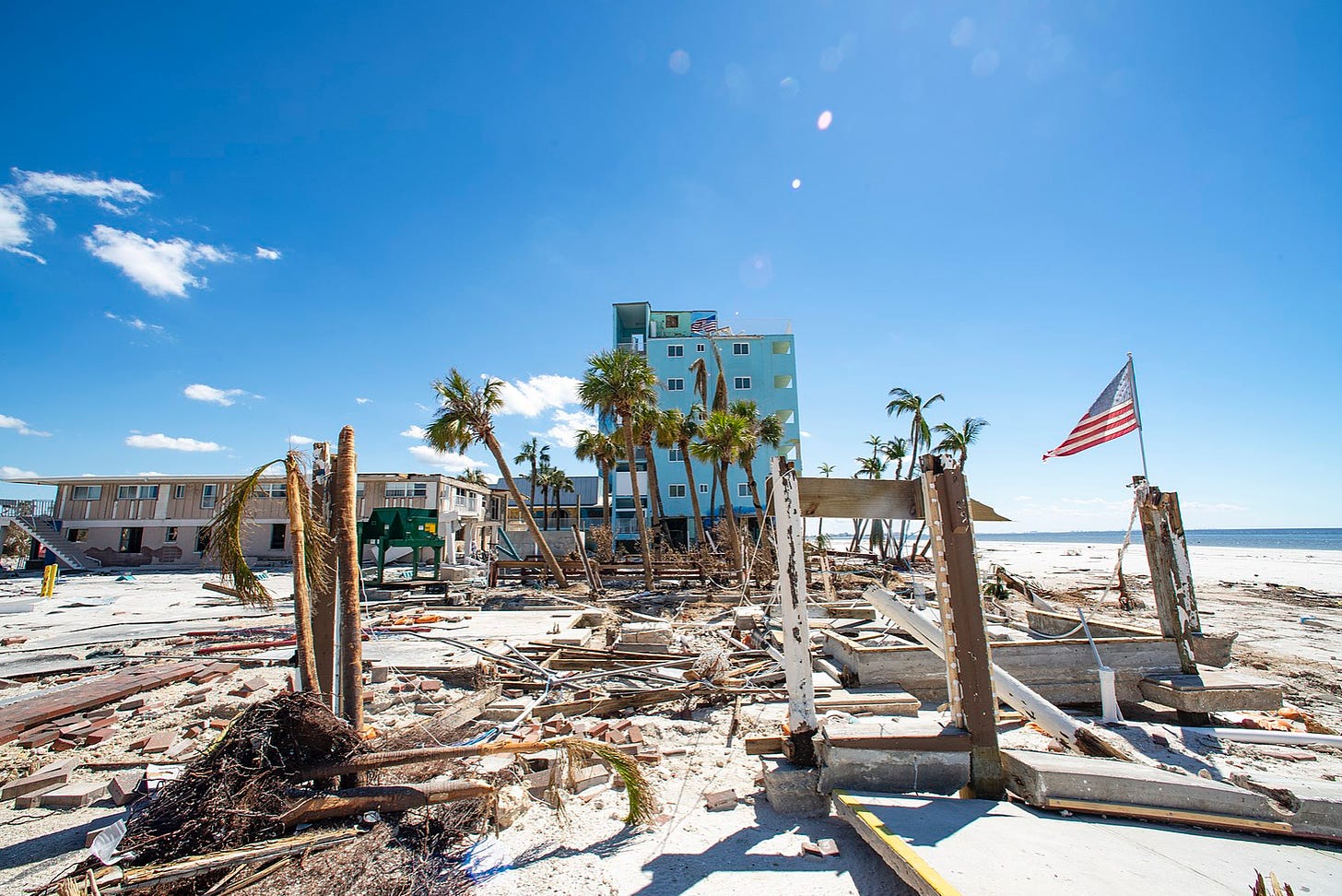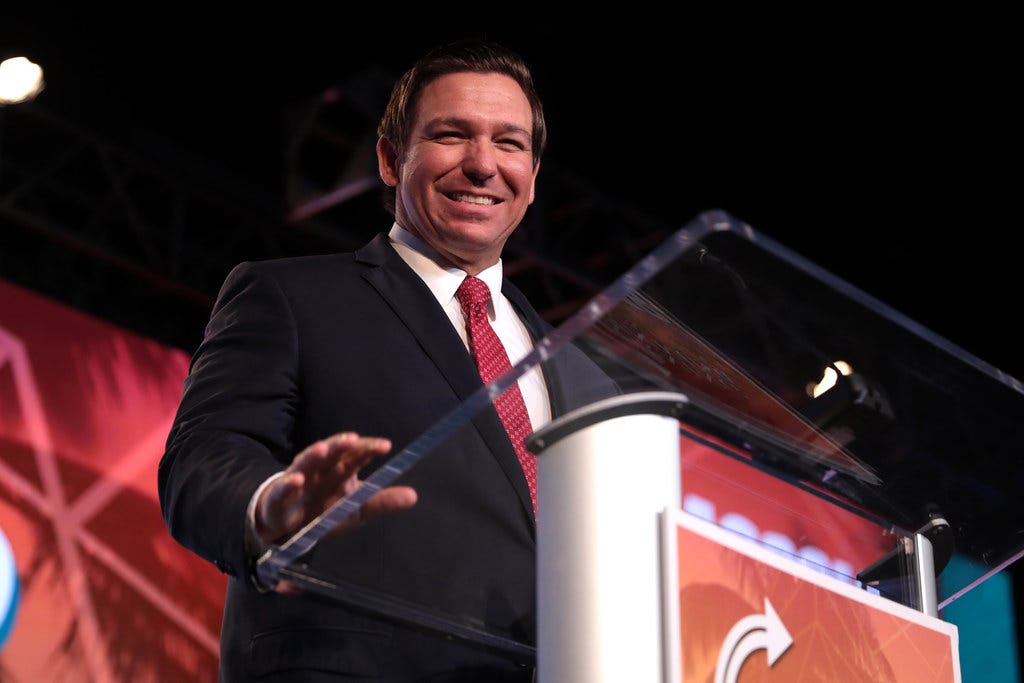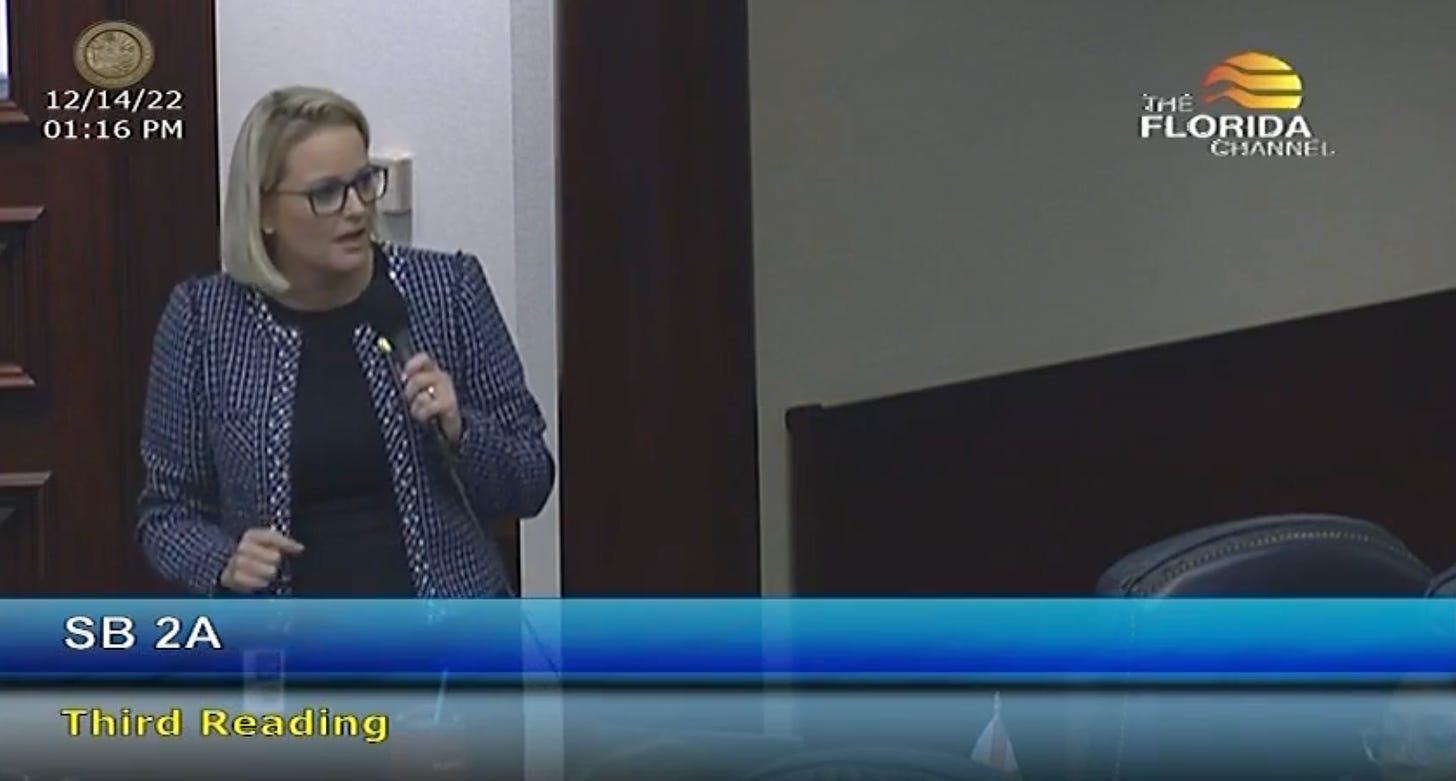Ron DeSantis made it harder for Floridians to fight their insurance companies. One of his aides is now fighting his insurance company.
Nearly a year after Hurricane Ian struck, thousands of Floridians are still fighting to get insurance claims paid. It's a struggle that hits close to home inside the DeSantis campaign for president.

This is Seeking Rents, a newsletter and podcast devoted to producing original journalism — and lifting up the journalism of others — that examines the many ways that businesses influence public policy across Florida, written by Jason Garcia. Seeking Rents is free to all. But please consider a voluntary paid subscription, if you can afford one, to help support our work.
Like so many people across Florida, David Polyansky experienced a double disaster when Hurricane Ian roared over the state last fall.
First, the storm badly damaged his Bonita Springs home. Then, his insurance company refused to cover the full cost of repairs.
But Polyansky is fighting back. With the help of a well-known lawyer, he and his wife have sued their insurance company in state court, in hopes that a jury will force the company to cover their claim.
The timing is fortunate. Because Polyansky’s battle with his insurance company began just before his boss made it much harder for other homeowners in Florida to stand up to their own insurers.
Polyansky works for Florida Gov. Ron DeSantis, a top strategist for DeSantis’ campaign for president. It’s a campaign DeSantis launched just a few months after he dramatically changed Florida’s property insurance laws — by taking important legal tools away from consumers facing off with insurance companies that delay, deny or underpay claims.
DeSantis’ insurance reform package, which the governor signed into law in December, reduced the time Floridians have to file claims. It erased their rights to make an insurer cover their legal bills or to have someone else sue in their stead. And it made it more challenging to win extra compensation from companies that won’t process claims fairly and in good faith.
The DeSantis administration defends the new law, which was enacted through a piece of legislation formally known as Senate Bill 2A and was widely praised by insurance industry lobbyists and front groups. The governor and other supporters say the changes are needed to cut down on excessive and expensive-to-defend lawsuits against insurance companies — litigation that can drive up the price of insurance and push some insurers out of Florida altogether.
“Legislation such as SB 2A will reduce the number of frivolous lawsuits, which is good for consumers and market competition,” said Jeremy Redfern, a spokesperson for DeSantis.

Of course, whether a lawsuit is “frivolous” depends upon whom you ask. Polyansky presumably believes his lawsuit is legitimate, for instance.
Polyansky could not be reached for comment. But according to his complaint, he is among the tens of thousands of southwest Florida homeowners whose properties were damaged or destroyed by Hurricane Ian, which hit the state on Sept. 28 and became the most expensive storm in state history. The suit doesn’t specify the damage, though Collier County permit records show post-hurricane restoration work involving cement board, plumbing and electrical wiring.
Polyansky’s suit says his insurance company — St. Petersburg-based Vyrd Insurance Co. — has refused to cover the full cost of repairs. The suit seeks more than $50,000 from the company.
Representatives for Vyrd declined to comment. But the dispute will be familiar to anyone who has lived through a hurricane in Florida: In its own filings, Vyrd claims it is not responsible for all the damage to Polyansky’s home because some of it was caused by water and other perils not covered by Polyansky’s policy.
Though Vyrd is a relatively new company, it is backed in part by SiriusPoint Ltd., a Bermuda-based insurance conglomerate with $11 billion in assets.
But Polyansky should have some powerful leverage on his side, too.
In most lawsuits, each side usually pays for their own lawyers. But Florida used to have a law that allowed a policyholder who must sue to make an insurance company pay a claim to then make that insurance company pay their legal bills, too.
It was known as Florida’s “one-way attorney fee” law. And it was meant to level the playing field between consumers and insurance companies, who have entire teams of adjusters and attorneys on their side.
By providing for one-way attorney fees, Florida made sure individual policyholders could still find competent lawyers to represent them, even if they couldn’t afford to pay out of their own pocket. It also ensured that a policyholder who won their suit didn’t end up having to spend money meant for home repairs on legal bills instead.
Polyanksy even invokes Florida’s one-way attorney fee law in his suit.
Florida had some version of a one-way attorney law on the books for more than 100 years — until December, when Ron DeSantis signed SB 2A and eliminated one-way attorney fees in lawsuits against property insurance companies.
(A few months later, by the way, DeSantis signed another bill that wiped out one-way attorney fees in lawsuits against every other kind of insurance company, too — a bill that was so anti-consumer that former President Donald Trump blasted it as a bailout for the insurance industry.)
The result is that future Floridians won't get to wield the same legal hammer that Polyansky is swinging now. (Polyansky filed his suit in June, after DeSantis signed SB 2A. But his policy was in force and his claim occurred before the law changed.)
To pursue his lawsuit against Vyrd, Polyansky hired Cassel & Cassel, a South Florida law firm that specializes in insurance litigation. The firm was co-founded by Hillary Cassel, who also serves as a Democrat in the state House of Representatives. She voted against SB 2A in December.
She and her partner declined to comment on the Polyansky case. But in her debate against SB 2A, Cassel said the legislation would make it more difficult for most Floridians to find lawyers willing to take on potentially long and pricey legal fights. She even said that she and her firm would likely have to pass on clients who couldn’t afford their hourly rates or who were fighting for relatively small claims — like, for instance, $20,000 to replace a roof.
“You’re taking away everything they [policyholders] have to hold them [insurance companies] accountable,” Cassel said during the debate.

Now, this might not be the sort of thing that would stop someone like David Polyansky from finding a lawyer and fighting back against a recalcitrant insurance company. Polyansky, whose primary home is in Houston, is wealthy enough to have a second home on the water in Florida that’s worth an estimated $4.7 million, according to Zillow.
But, of course, you shouldn’t have to be rich just to get a fair shake from your insurance company.
It sure looks like SB 2A is already starting to cut some people off from the courts, too.
For instance, the top executive at Fort Lauderdale-based Universal Insurance Holdings Inc. said last month that fewer people are filing lawsuits against the company since DeSantis signed the new state law.
“Our optimism is driven by the legislation and how we’re seeing that impact our numbers,” Universal CEO Steve Donaghy told analysts during a recent quarterly earnings call. “Inbound litigation…continues to decrease. And we expect to see that trend throughout the year.”
Meanwhile, Tampa-based HCI Group Inc. recently reported that it is becoming more profitable because of fewer claims, fewer lawsuits and higher prices.
The company’s “gross loss ratio” — the money it pays out in claims and related expenses versus the money it brings in through premiums — improved to 34 percent during the second quarter of this year, compared to 47.9 percent during the same period last year.
“On previous earnings calls, we’ve said we expected a material beneficial impact from the new legislation in Florida — and that impact is starting to show up in our results,” Chief Financial Officer Mark Harmsworth said on another earnings call. “Litigation is coming down.”
But while DeSantis’ insurance reform may be improving insurance company fortunes, there’s little sign any of that benefit is yet trickling down to consumers in Florida. Rates continue to rise, forcing some families to leave the state. More companies have pulled out of the market. And many Floridians are struggling to get claims paid.
To be clear, there is evidence to suggest that excessive lawsuits really were a problem in Florida’s insurance market.
Industry executives and lobbyists have been publicly screaming about litigation schemes and scams for years. And the Governor’s Office says that 79 percent of the nation’s homeowners’ insurance lawsuits are filed in Florida, even though the state only accounts for 9 percent of the nation’s homeowners’ insurance claims. (Although critics say that statistic is missing data from some states; it also doesn’t tell you anything about why so many insurance lawsuits are filed in Florida.)
But litigation is hardly the only problem. And it may not even be the biggest one in a state that juts out into the Atlantic Ocean in an era of hotter temperatures, higher seas and stronger storms — and where regulators have repeatedly failed to thoroughly investigate complaints.
A recent investigation by the Tampa Bay Times found that many Florida insurance companies have been sidestepping caps on profits by making inflated payments to out-of-state sister companies. The Times also found that regulators have repeatedly connected these “excessive or unusual payments” to insurer failures — yet Florida’s governor and lawmakers have refused to do anything about that.
They’ve ignored other potential solutions, too.
DeSantis and other supporters keep saying it’s too soon to judge whether the state’s aggressive crackdown on insurance lawsuits will work out. And to be fair to them, it probably is too soon.
But it’s certainly not working yet…at least not if the goal is to help real homeowners trying to live in Florida, rather than just a few insurance companies trying to make some money here.





“The DeSantis administration defends the new law, which was enacted through a piece of legislation formally known as Senate Bill 2A and was widely praised by insurance industry lobbyists and front groups.”
Of course DeSatan will defend the bill. After all, he signed it after taking millions from insurance lobbyists for his soon to be failed, presidential campaign.
I agree, there is a lot of insurance fraud in Florida, but instead of signing bills these insurance companies have “bought and paid for” through lobbyists, perhaps take a cue from other states that have managed to keep insurance premiums low, and still provide consumer protections.
This is a giveaway, plain and simple, and the idea that rates will miraculously drop is ludicrous. When was the last time any insurance company for which you are a client, has ever reduced rates, unless forced by the courts to do so? It’s a rhetorical question, no need to answer.
DeSatan is a plague in Florida, he would have never been re-elected had he signed this bill, and his education and immigration draconian laws during his first term.
The man is a puppet of right-wing billionaires and corporations. Hell, he even pulled a Trump and let Leonard Leo of The Federalist Society pick DeSatan’s last four judicial picks to Florida’s Supreme Court; now they have a “right-wing” majority. Leo doesn’t even live in the state (he lives in Maine) and he’s deciding the future for more than 21 million Floridan’s?
DeSatan is a joke. As a Floridian who finds him nothing more than a pathetic, authoritarian Il Duce, I plead with America not to allow this charlatan anywhere near the oval. He’ll do to America what he’s done to Florida; make it insolvent and stupid (educational reforms).
Enough said!....:)
In the olden days, “The customer is king” was the motto of most companies. What happened? When did it change to “cheat the customer in anyway you can?” I don’t even want to buy anything anymore.